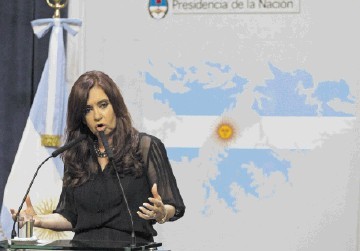
Argentina ended some financial incentives today that were intended to boost energy investment in its huge shale oil and gas deposits, even as it seeks to narrow an energy trade gap.
The government announcement in an official gazette comes as Argentina seeks to develop its its vast but barely tapped Vaca Muerta shale deposits, to help it trim a $6billion trade deficit in oil, gas and electrical energy supply.
Launched in 2008, the incentive programme grants tax credits for investments directed toward boosting reserves and increasing oil production from shale and conventional deposits.
Oil company officials privately complain that President Cristina Fernandez’s unorthodox policy-making is often unpredictable and makes doing business in Latin America’s third largest economy difficult.
Even so, the scrapping of the tax credits, which were introduced when the government-controlled price for locally produced oil was significantly below the global market price, is not expected to damage the industry as domestic crude prices are now higher than those of world markets.
“The state now is looking to pay its debts from the programme, which worked well as it maintained activity in the sector,” an oil company official said on condition of anonymity.
Oil producers in Argentina currently receive $77 per barrel, while Brent crude was today trading at $57.70.
Other Argentine incentives remain in place. In January, the government unveiled a stimulus that guaranteed producers a maximum $3 per barrel subsidy when quarterly output exceeds a government-set base level. Exporters receive up to an additional $2 per barrel for every barrel of crude shipped abroad.
Developing Vaca Muerta, a formation that covers an area similar to Belgium, will cost up to $200billion over the next 10 years, state-controlled energy firm YPF says.
Recommended for you
